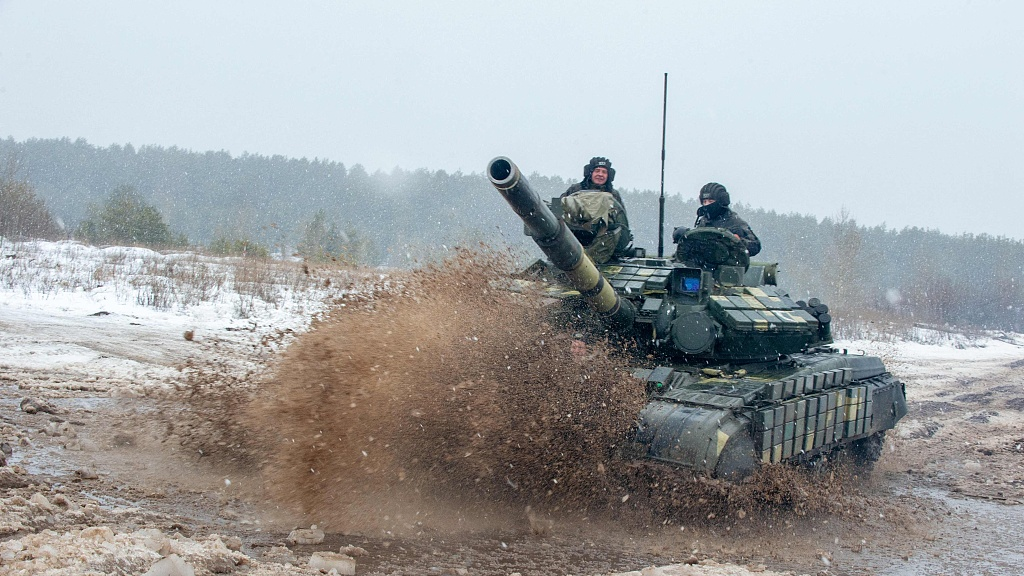
Russian army tanks loaded onto railway platforms to move back to their permanent base after drills in Russia, February 16, 2022. /VCG
Russian army tanks loaded onto railway platforms to move back to their permanent base after drills in Russia, February 16, 2022. /VCG
Editor's note: Mariam Shah is an Islamabad-based independent researcher in the field of conflict studies and military psychology. The article reflects the author's opinions and not necessarily the views of CGTN.
Russia announced that it is withdrawing some troops from the Ukrainian border. Soon after the announcement, Russian foreign ministry spokeswoman Maria Zakharova wrote on Telegram: "February 15, 2022 will go into history as the day Western war propaganda failed. They have been disgraced and destroyed without a single shot being fired." This is no doubt a decisive blow to the Western propaganda war machinery and warmongering that has been active since the start of this Russia-Ukraine crisis.
Just a few days ago, United States claimed that a Russian invasion could happen anytime soon, including a possible airstrike and the media hyped it irresponsibly. Subsequently, the U.S. and its allies including Australia, New Zealand, Britain, Japan, Latvia, Norway, Netherlands and Israel urged their citizens to leave Ukraine to avoid a Russian invasion. In recent remarks by President Joe Biden providing an update on Russia and Ukraine, he said, "An invasion remains distinctly possible. That's why I've asked several times that all Americans in Ukraine leave now before it's too late to leave safely. It is why we have temporarily relocated our embassy from Kyiv to Lviv in western Ukraine."
Despite heavy troop deployments on the border, Russia, on the other hand, repeatedly stated that it will not invade Ukraine, but its legitimate security concerns need to be addressed by the international community, especially Ukraine and NATO. Recently, the Russian defense ministry shared videos of tanks moving back to bases, implying that it has no intention of invading Ukraine. Besides, the Russian military also announced that some troops have started returning to their bases after the conclusion of military exercises, as per the local news bureau Ifax. A Russian defense ministry spokesman said, "Units of the Southern and Western military districts, having completed their tasks, have already begun loading onto rail and road transport and today they will begin moving to their military garrisons." This partial drawdown of Russian troops from the border shows that Russia has no serious intention of waging a war at the moment; rather it was more of pressure to caution Ukraine not to join NATO.

Ukrainian servicemen of the 92nd mechanised brigade conduct live-fire exercises near the town of Chuguev, Kharkiv region, February 10, 2022. /VCG
Ukrainian servicemen of the 92nd mechanised brigade conduct live-fire exercises near the town of Chuguev, Kharkiv region, February 10, 2022. /VCG
At 4 p.m. on February 5, Bloomberg aired a headline on their website titled "Russia Invades Ukraine" and later apologized for the "mistake" by issuing a statement on a publishing error. Later, a few other media outlets used this headline citing Bloomberg and this became one of the most reckless demonstrations of journalism by Western media agencies, clearly showing the frenzy they wanted to create in this entire crisis. In late January, Ukrainian President Volodymyr Zelenskyy requested the West, pointing towards the Western media, to avoid creating "panic" about the confrontation with Russia. He said, "We don't need this panic," at a news conference, mentioning that it is hurting Ukraine's already tattered economy.
If the individuals and nations are crammed by disinformation, it will affect public perception and policy. Western media were broadcasting warnings of an imminent Russian invasion, and false propaganda can take situations to huge mistrust, crisis and devastation. Many people in Russia have termed the U.S. warnings of an "imminent attack" as "hysteria" and "absurdity," and many of them believe that the U.S. is intentionally adding fuel to the fire and igniting panic.
Western media outlets need to realize the level of damage, especially the psychological harm they have been causing due to their prejudiced misreporting. The hype that has been created over the span of the last few weeks has been extremely rash and the U.S. and other Western media have been playing the role of arsonists in the entire Ukraine crisis. Chinese Foreign Ministry spokesperson Wang Wenbin warned at a press conference that "advocating for confrontation is a regression to the obsolete Cold War-era tactics."
From the very start, the entire take of the Western media on the crisis was anti-Russian. China stated that the inflammatory rhetoric on Ukraine has been "irresponsible" and it urged all parties to create all conditions needed for a political solution in a fair and open manner. During the last few days, rather than talking about peace and possible negotiations that can be carried out to avert any further escalation between Russia and Ukraine, Western media aggravated the war narrative and misused the fragility of the situation. In 2003, the same propaganda, warmongering and false/misled information by U.S. officials led to the invasion of Iraq, precisely on the claims of WMDs.
The hype that was created in the milieu of this crisis was highly irresponsible and showed the extent to which U.S. and Western media can go to vilify Russia by quoting anonymous sources several times. For the last two months, tensions mounted over the Ukraine-Russia crisis and it engulfed the entire world in speculation of a possible war in the region. In these times, responsible media could have averted psychological pressure that was building all across. Now, as a result of successive diplomatic efforts, the drawdown of Russian troops at the border is a good sign and vital in resorting to peace and negotiations. Soon the Western war propaganda will fail miserably. Besides, Russia also told the U.S. that Moscow looked for "pragmatic dialogue" and stressed that it was necessary to continue "joint work."
(If you want to contribute and have specific expertise, please contact us at opinions@cgtn.com.)

